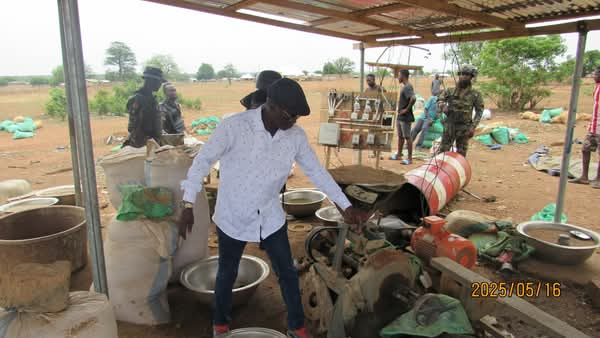The Upper East Region of Ghana is facing a growing crisis due to the surge in illegal mining, locally known as “galamsey,” particularly in the districts of Bongo, Talensi, Nabdam, and the Kassena-Nankana Municipality. This illicit activity is leaving a trail of environmental destruction and social disruption, prompting urgent calls for intervention. The Regional Minister, Hon. Donatus Akamugri, conducted a firsthand assessment of the affected areas, witnessing the devastating impact of the illegal operations on farmlands and the broader environment. The scale of the problem has reached alarming proportions, sparking community outrage and demanding immediate action from authorities.
A recent security operation, codenamed “SWOOP,” resulted in the confiscation and destruction of various mining equipment used in these illicit activities. Among the items seized and destroyed were compressors, grinding motors, makeshift shelters, and motorbikes. This operation underscores the commitment of the regional government to combat illegal mining, but also highlights the pervasive nature of the problem, requiring sustained and multifaceted efforts to effectively address it. The seized equipment represents not only the tools of environmental destruction but also the investment made by individuals engaging in this illegal trade, indicating the potential financial incentives driving this harmful practice.
The Minister’s visit was prompted by a petition from the Naaga-Sakombiisi community, highlighting the severity of the situation in their area and expressing frustration over the perceived inaction of authorities despite previous reports. The community’s direct appeal to the Regional Coordinating Council (RCC) emphasizes the growing sense of urgency and the need for immediate and decisive action. The community’s concerns underscore the importance of responsiveness from local authorities and the need for effective communication channels between communities and government agencies. This direct engagement also highlights the crucial role of community involvement in identifying and reporting illegal activities.
Beyond the immediate environmental damage, the use of hazardous chemicals in the mining process poses a significant threat to public health. Residents have voiced concerns about the potential long-term health consequences of these chemicals leaching into the water supply and soil, raising fears of increased disease outbreaks and other health complications. This indiscriminate use of chemicals without proper regulation or oversight poses a significant risk to both human health and the delicate ecological balance of the region. The lack of environmental safeguards in these illegal operations necessitates comprehensive assessment and remediation efforts to mitigate the long-term health and ecological impacts.
Adding another layer of complexity to the issue is the illegal tapping of electricity from community transformers by the miners. This unauthorized practice places a strain on the power grid, leading to frequent power outages and disrupting the daily lives of residents. The theft of electricity not only impacts the quality of life for local communities but also represents a significant economic loss and undermines the stability of the power infrastructure. This illegal activity necessitates stronger enforcement measures and collaboration with electricity providers to prevent such theft and ensure a stable power supply for residents.
Addressing this complex challenge requires a multi-pronged approach involving various stakeholders. The Regional Minister stressed the importance of collaboration between local communities, law enforcement agencies, and relevant government institutions. He called for increased community vigilance, urging residents to report any suspicious activities to the appropriate authorities. This collaborative approach recognizes that tackling illegal mining effectively requires a concerted effort from all stakeholders, combining local knowledge with the enforcement capabilities of government agencies. Furthermore, empowering local communities to actively participate in monitoring and reporting illegal activities is crucial for long-term success in combating this menace. This community involvement not only strengthens surveillance but also fosters a sense of ownership and responsibility in protecting the environment. The Minister’s call for a multi-sectoral approach also emphasizes the need for coordinated strategies and resource allocation across different government agencies to effectively address the multifaceted nature of the illegal mining problem. Furthermore, the involvement of regulatory bodies responsible for environmental protection and public health is crucial in mitigating the long-term impacts of these illicit activities. The collaborative efforts must also encompass educational and awareness campaigns to inform communities about the dangers of illegal mining and the importance of sustainable practices. In addition, alternative livelihood programs should be explored to provide economic opportunities for those involved in illegal mining, diverting them away from these destructive activities and towards sustainable livelihoods. Finally, strengthening the legal framework and enforcement mechanisms is essential to deter illegal mining and hold perpetrators accountable. This includes stricter penalties, enhanced monitoring capabilities, and improved prosecution processes to ensure that those engaged in these illicit activities face the full force of the law. A comprehensive approach, encompassing all these aspects, is crucial to effectively combat the scourge of illegal mining and protect the environment and public health in the Upper East Region.














